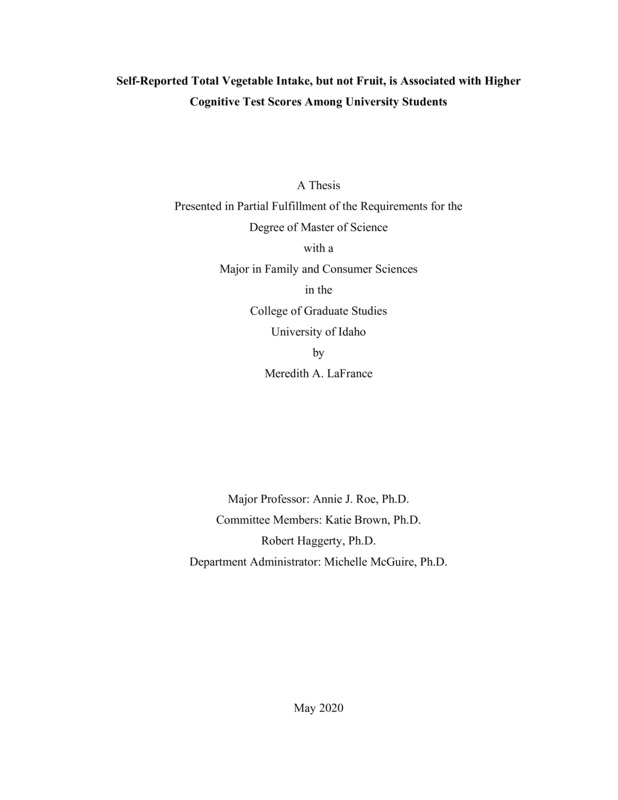Self-Reported Total Vegetable Intake, but not Fruit, is Associated with Higher Cognitive Test Scores Among University Students
LaFrance, Meredith. (2020-05). Self-Reported Total Vegetable Intake, but not Fruit, is Associated with Higher Cognitive Test Scores Among University Students. Theses and Dissertations Collection, University of Idaho Library Digital Collections. https://www.lib.uidaho.edu/digital/etd/items/lafrance_idaho_0089n_11832.html
- Title:
- Self-Reported Total Vegetable Intake, but not Fruit, is Associated with Higher Cognitive Test Scores Among University Students
- Author:
- LaFrance, Meredith
- ORCID:
- 0000-0002-3611-1226
- Date:
- 2020-05
- Program:
- Family and Consumer Sciences
- Subject Category:
- Nutrition
- Abstract:
-
Fruit and vegetable (F/V) consumption throughout the lifespan plays an important role in maintaining optimal physical health; however, additional research focusing on college students is needed. University of Idaho students (n=23) participated in this cross-sectional study to investigate relationships between dietary F/V intake and 1) cognitive outcomes, 2) psychological well-being, and 3) skin carotenoid concentrations. Dietary F/V intake was assessed using the Automated Self-Administered 24-hour (ASA24) Dietary Assessment Tool (version 2018). Cognitive and emotional outcomes were assessed via the NIH Toolbox® for Assessment of Neurological and Behavioral Function (NIH Toolbox). Skin carotenoid concentrations were estimated using Resonance Raman spectroscopy (RRS). Spearman’s correlations (with and without an income adjustment) were used to evaluate relationships between variables using SAS software. Cognitive scores were adjusted for age, gender, race, ethnicity, educational attainment, and parent education.
Higher processing speed was associated with higher total vegetable intake (R2=0.56, p=0.01) and higher combined F/V intake (R2=0.43, p=0.04) with the added income adjustment. Intake of dark-green vegetables positively correlated with executive function (R2=0.42, p=0.05), as well as processing speed (R2=0.45, p=0.04) and fluid cognition (R2=0.48, p=0.02). Additionally, consumption of foods rich in lycopene positively correlated with processing speed (R2=0.43, p=0.05) and fluid cognition (R2=0.41, p=0.05). While there was no significant relationship between F/V consumption and skin carotenoid scores, there was a significant positive relationship between skin carotenoid scores and dietary intake of beta-carotene (R2=0.50, p=0.01), lycopene (R2=0.42, p=0.05), and total carotenoids (R2=0.72, p=0.0001).
There was no association between total dietary F/V intake and emotional health measures; however, consumption of dark-green vegetables, consumption of legumes, and skin carotenoid sores were inversely related to negative affect (R2=-0.45, p=0.04; R2=-0.42, p=0.05; R2=-0.50, p=0.02, respectively). Legume intake and skin carotenoid scores were also positively related to psychological well-being (R2=0.44, p=0.04; R2=0.48, p=0.02, respectively). Results of this study suggest a relationship between dietary intake of total vegetables and higher processing speed scores, but no relationship between total fruit and cognitive outcomes. Further research with larger sample sizes is needed to comprehensively evaluate these relationships among university students.
- Description:
- masters, M.S., Family and Consumer Sciences -- University of Idaho - College of Graduate Studies, 2020-05
- Major Professor:
- Roe, Annie J
- Committee:
- Brown, Katie; Haggerty, Robert
- Defense Date:
- 2020-05
- Identifier:
- LaFrance_idaho_0089N_11832
- Type:
- Text
- Format Original:
- Format:
- application/pdf
- Rights:
- In Copyright - Educational Use Permitted. For more information, please contact University of Idaho Library Special Collections and Archives Department at libspec@uidaho.edu.
- Standardized Rights:
- http://rightsstatements.org/vocab/InC-EDU/1.0/

